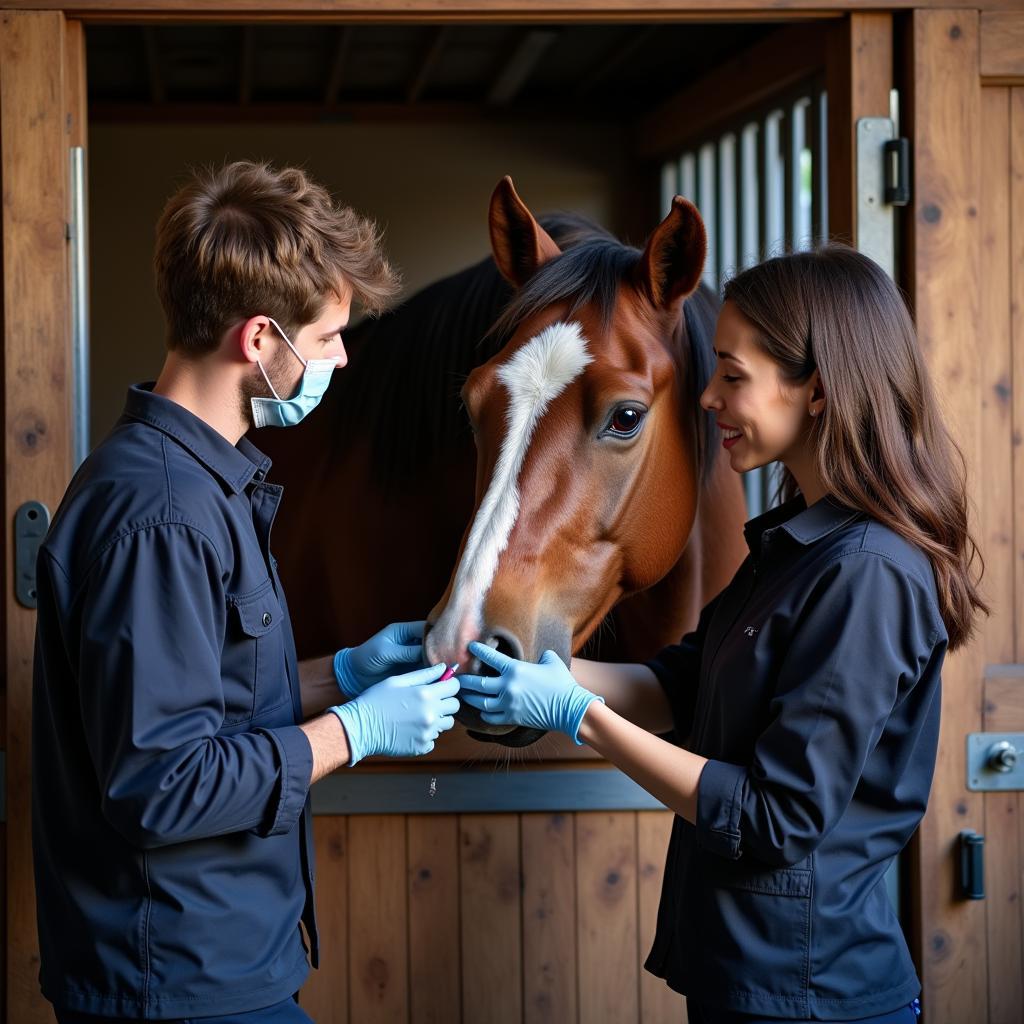When your horse experiences a sudden illness or injury, every second counts. Knowing how to find an Emergency Horse Vet can be the difference between life and death. This guide will provide you with the essential information you need to be prepared for any equine emergency.
Recognizing Equine Emergencies: When to Call the Emergency Horse Vet
Knowing when your horse requires immediate veterinary attention is crucial. Some common signs of equine emergencies include:
- Colic: Signs of abdominal pain, such as pawing, rolling, sweating, and looking at their flank.
- Lameness: Sudden onset, severe limping, or inability to bear weight.
- Wounds: Deep lacerations, punctures, or wounds that are bleeding profusely.
- Respiratory Distress: Labored breathing, flared nostrils, coughing, or nasal discharge.
- Neurological Issues: Stumbling, incoordination, seizures, or head pressing.
- Eye Injuries: Obvious trauma, excessive tearing, or cloudiness.
What constitutes an emergency can vary, but if you’re unsure, it’s always best to err on the side of caution and contact an emergency horse vet.
6701 black horse pike egg harbor township nj 08234
Locating an Emergency Horse Vet: Be Prepared
Don’t wait for an emergency to happen before figuring out who to call. Preparation is key.
- Your Regular Veterinarian: Start by checking if your regular vet offers emergency services or has an after-hours contact number. They will likely have established relationships with emergency horse vets in the area.
- Online Directories: Several online directories specialize in listing equine veterinarians, including those who provide emergency services.
- Local Equine Hospitals: Search for equine hospitals or clinics in your region. These facilities are typically equipped to handle emergencies 24/7.
- Word of Mouth: Ask fellow horse owners, trainers, and farriers for recommendations on reliable emergency horse vets in your area.
- Horse Boarding Stephenville TX facilities can be a great resource for local vet recommendations.
How to Find an Emergency Horse Vet Quickly in a Crisis
When an emergency arises, quick action is vital. Have a list of emergency contacts readily available, both in your phone and printed out and posted in your barn.
horse boarding stephenville tx
What Information to Provide the Emergency Horse Vet
Be prepared to give the emergency horse vet as much information as possible about your horse’s condition. This includes:
- Signalment: Age, breed, sex, and any underlying medical conditions.
- Onset of Symptoms: When did you first notice the problem?
- Current Condition: Describe your horse’s current symptoms in detail.
- Any Treatments Administered: Have you given any medications or first aid?
 Horse Owner Calling Emergency Vet
Horse Owner Calling Emergency Vet
“In emergency situations, providing detailed information quickly can drastically improve the outcome for your horse,” says Dr. Emily Carter, DVM, an equine specialist with over 20 years of experience.
After the Emergency: Follow-Up Care
After the initial emergency visit, follow your vet’s instructions carefully regarding aftercare. This may include medications, stall rest, bandaging changes, or follow-up appointments.
What to Expect During an Emergency Vet Visit
The emergency horse vet will perform a thorough examination and may recommend diagnostic tests such as blood work, X-rays, or ultrasound. Be prepared for potential costs associated with these procedures.
“Don’t hesitate to ask questions,” advises Dr. James Thompson, DVM. “Understanding your horse’s condition and the treatment plan is essential for a successful recovery.”
 Emergency Horse Vet Administering Treatment
Emergency Horse Vet Administering Treatment
Having a plan and knowing how to locate an emergency horse vet is paramount to your horse’s well-being. Being prepared can save precious time in a crisis and potentially save your horse’s life. Remember to keep your regular vet’s contact information, as well as a list of local emergency horse vets, readily available.
FAQ:
- What if I can’t reach my regular vet after hours? Have a backup list of emergency horse vets.
- How much does an emergency horse vet visit cost? Costs vary depending on the services required.
- What should I have in my equine first-aid kit? Essential items include bandages, antiseptic, thermometer, and a stethoscope.
- How can I prevent equine emergencies? Regular vet checkups, proper nutrition, and a safe environment are crucial.
- What if my horse needs to be transported to a hospital? Discuss transportation options with the emergency vet.
- Is colic always an emergency? While not all colic cases are life-threatening, it’s always best to contact a vet.
- How do I know if a wound requires stitches? Deep or profusely bleeding wounds typically require stitches.
For further assistance, contact us at Phone: 0772127271, Email: [email protected] or visit us at QGM2+WX2, Vị Trung, Vị Thuỷ, Hậu Giang, Việt Nam. We have a 24/7 customer service team.